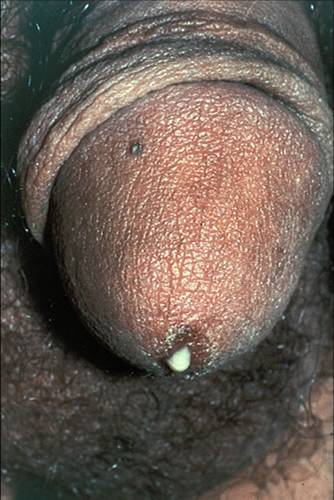What is gonorrhoea?
- Gonorrhoea is a sexually transmitted disease caused by Neisseria gonorrhoea. This bacteria can spread from one person to another via vaginal, anal or oral sex even when the infected person has no symptoms.
- They can also be passed from mother to baby during birth.
How would you know if a person has gonorrhoea?
For girls :
- Girls may have no symptoms or very mild symptoms that are not noticeable until the disease becomes more severe.
- They may present with burning sensation during passing urine or yellow-green vaginal discharge.
- There might even be bleeding in between periods (intermenstrual bleeding).
If the infection spreads, it may cause Pelvic inflammatory disease.
For boys :

Pass this charge from penis
- Boys are more likely to notice symptoms.
- They often have a burning sensation when passing urine or a yellowish discharge oozing out of urethra.
- Symptoms may occur 2 to 7 days after exposure and in girls, it may even appear later.
Are there any serious complications?
- Gonorrhoea can be very dangerous if left untreated.
- In girls, it can cause Pelvic inflammatory disease.
- In boys, it can spread to the epididymis and cause pain and swelling in the testis.
- It can also create scar tissues leading to infertility.
Can gonorrhoea be treated?
- It certainly can.
- If you or your partner has gonorrhoea, see a doctor.
- The doctor will take a swab from the discharge and analyze it.
- Your doctor can prescribe some antibiotics to treat the infection for both you and your partner.
- Taking this antibiotic can cure you but it won’t make you immune to gonorrhoea.
- You can always get reinfected if you are exposed again.
Can gonorrhoea be prevented?
Yes!
The best way is to avoid sex.
![]()
- If you are below 16 years old, having sex is illegal unless you are married.
- The Malaysian law states that consensual sex with girls below 16 years old will lead to the male being charged with statutory rape.
- However gonorrhoea transmission can be prevented by :
- If you are sexually active, practice safe sex.
- Be loyal to one partner. Avoid multiple partners.
- Use condoms. However condoms are not 100% effective in preventing gonorrhoea but are able to reduce the risk of transmission.
- Avoid taking alcohol or drugs that can impair your judgement.
- If you are sexually active, practice safe sex.
| Last Reviewed | : | 27 April 2012 |
| Content Writer | : | Dr. Hargeet Kaur a/p Basant Singh |
| Reviewer | : | Dr. Nik Rubiah bt. Nik Abd. Rashid |







